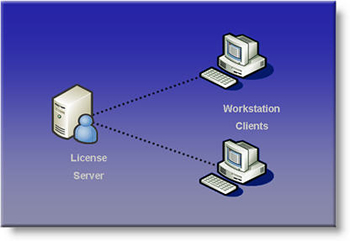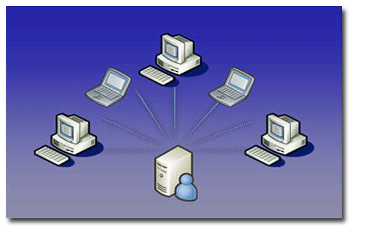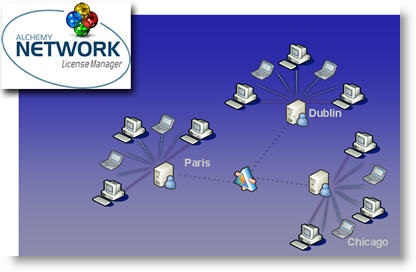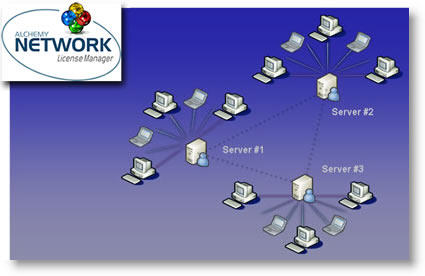Network License
Network Licensing is a powerful and flexible technology which maximises the availability and usage of Alchemy products throughout the enterprise. Based on the industry standard for enterprise wide license management, it extends the ease and flexibility in deploying Alchemy products and reduces the total cost of ownership (TCO).
Network Licensing enables you to share all your Alchemy product licenses across your organization. It creates a 'pool' of centralized licenses that can be used across multiple client workstations and different geographical locations.
Alchemy Network License Manager™ 3.0 is a server based technology which helps manage this 'pool' of licenses. It provides secure access to and centralized management of all Alchemy product licenses across the enterprise.
Alchemy Software Development uses two types of software licensing: Stand-Alone (single installations) and Network license.
| Type | Usage | Flexibility | Usage Tracking | Control |
| Stand-Alone | One license installed on one computer | One license for each computer | No | By individual |
| Network License | Multiple licenses tied to a central server and dynamically allocated to multiple client computers | One license for many computers; dynamic license pool; license borrowing for remote use; fault-tolerant server deployment; scalable license server pool; | Yes | By deployment |
Stand-Alone License
This license type is the most commonly used. It binds the software to a specific workstation. This type of installation is most effective when there is little or no need to share the license, or move it from one workstation to another. This is also the default type of license for all Alchemy products.
Network License
This license type requires communication between the client software (the application installed on the user's PC) and network license management software (Alchemy NETWORK License Manager) installed on a central license server. When an Alchemy CATALYST installation runs, it acquires a license from the server, returning that license when it is shut down. Licenses can thus be "floated" over an entire corporate network, transferring from one workstation to the next as required.
A Network License creates a pool of license that client workstations can use. This enables Alchemy product licenses to be shared across the enterprise with ease.
Using Network Licenses, every client workstation can have an installation of Alchemy CATALYST. This improves the availability of Alchemy technology while the central license server provides a secure and easy to manage administration console.
Using Network Licenses, Alchemy CATALYST is available anytime, anyplace, anywhere.
Key Benefits
The benefits of Network Licensing are:
- Flexible & efficient Usage of Licenses: Licenses can be managed centrally and deployed on every desktop within your group, effectively sharing your license pool across the enterprise.
- Usage Tracking: Because a central license server manages all licenses, an administrator can keep track of how licenses are being used. This is useful data for day-to-day administration of licenses as well as input for the budgeting and forecasting process for future software investments.
- Control: Network licensing gives an administrator control over an individual user's or group's ability to access software. Licenses can be moved from one group to another without having to install or uninstall software.
- Standardization: The Network License Manager in Alchemy CATALYST 6.0 is based on FLEXlm® technology from Macrovision Corporation, the de facto standard for network licensing.
Configurations
There are three configurations available for Network Licenses:
- Single License Server: Ideal for small deployments that want to centralize all licenses on a single license server. Works best in LAN topologies.
This is the simplest license server configuration and is the one that most companies start with. As stated earlier, the hardware and software requirements for a license server are fairly modest. Memory and CPU usage is small (although it is affected by the number of clients using the server), and the only disk space requirements are for the FLEXlm™ utilities and the log files (which can get quite large). The main requirement is that every client workstation that needs access to an Alchemy CATALYST license should be able to access the license server with low latency (low delay) and high availability.
If communications between the server and client are disrupted, the Alchemy CATALYST license will time out after a period and Alchemy CATALYST will revert to evaluation mode. The licensing software is designed to compensate for brief periods of downtime, but if communications are not restored in time, then Alchemy CATALYST warns the user that it has lost contact with the license server.

In this scenario, all Alchemy product licenses are centralised on a single server. Alchemy CATALYST is then installed on an unlimited number of client machines across your organization. When Alchemy CATALYST is launched, the Alchemy NETWORK License Manager will issue a license to the client machine. Once Alchemy CATALYST is closed down on the client, the license is automatically released back to the license server. This effectively 'floats' your license across every machine in your organization.
If you do not want to share licenses between groups of users, then you can set up multiple Single License Servers for each group. The main disadvantage with this method is that you cannot share licenses between servers. Even if the licenses on server A are not being used, users on server B cannot access them (which may be acceptable, especially if the groups of users are on separate budgets). An advantage to this setup is that the failure of one server will not affect licenses on the other servers. If you want to share licenses between servers, then your best option is the next configuration: Distributed License Servers.
- Distributed License Server: Best overall option that allows for multiple license servers that pool aggregate number of licenses and makes them available to the entire organization. This technology is extremely easy to deploy and scales easiest with the growth in the number of Alchemy licenses and locations. It also has the benefit of working in both LAN and WAN topologies.
This configuration allows you to distribute your licenses over a number of different license servers. This cluster of license servers, creates a 'pool' of available licenses consisting of the aggregated number of licenses from each individual server.
When a workstation attempts to retrieve a license, it can poll all of the servers until it is able to obtain an Alchemy CATALYST license. Each user's workstation has the paths to all (or some, at your discretion) of the license servers available, as defined during installation and product activation. If a user is denied a license on the first server on the list, then the software automatically tries the second server on the list, and so on.

This configuration is ideal if you have a number of different groups, each using a license server. By configuring your workstations to poll each of your individual Alchemy NETWORK License servers, you create a virtual 'pool' of all your licenses. This aggregates your licenses ensuring that you maximize the availability of each product license across your entire organization.
In this scenario, the client organization has three engineering offices, each with their own individual license server. These License servers are clustered together to aggregate all licenses into one large 'pool' of licenses. When a workstation in Dublin requests an Alchemy License, it first polls the Dublin license server, if this server cannot release an available license, the Paris server is then polled and so on until a license is located and released to the workstation.
In this configuration, should an individual license server crash or be taken out of service by your system administrator, the Alchemy NETWORK License Manager will continue to service license requests for the other license servers in the cluster. This improves license availability across your entire organization and improves service levels from your central IT department.
This configuration is also the most scalable of Network Licenses. You can add more License Servers to this configuration as your usage and number of licenses expand. In addition to this it can work over both a LAN and WAN network topology.
- Redundant License Server: A configuration of precisely three license servers that communicate with each other and collectively manage the pool of licenses. If any one of the server goes down, the pool is still available to the organization. This configuration, while the most fault tolerant, works best on a Local Area Network (LAN).
This server configuration is for situations that require extremely high availability. It is also the most demanding configuration to manage. A redundant configuration shares a single pool of licenses over three servers (it has to be exactly three) that are in constant communication with each other.

As a result, if a server fails or is shut down for maintenance, the remaining servers support the whole license pool, with no negative effect on license availability. This configuration requires that all three servers reside on the same subnet and have consistent network communications (unlike distributed servers, which can work together over a wide-area network).
This license configuration needs precisely three license servers configured so that they can communicate with each and works best in low-latency LAN environment. While it does provide a higher level of fault-tolerance than Distributed Server deployments it cannot scale as easily since you cannot add more license servers as your usage expands.
Other Resources
For further information on Network License and Alchemy NETWORK License Manager™, please refer to:
 White Paper - Benefits of Network License: this paper discusses the different configurations possible with Alchemy NETWORK License Manager.
White Paper - Benefits of Network License: this paper discusses the different configurations possible with Alchemy NETWORK License Manager.
 Network License - Frequently Asked Questions: This is a technical document containing answers to frequently asked questions about product installation, activation and Network Licensing.
Network License - Frequently Asked Questions: This is a technical document containing answers to frequently asked questions about product installation, activation and Network Licensing.





